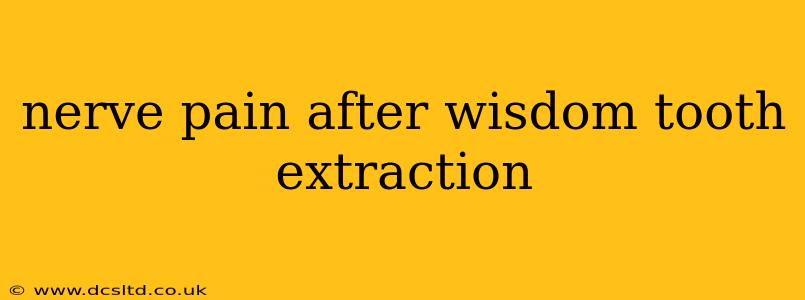Wisdom tooth extraction is a common procedure, but it's not without potential complications. One of the most concerning is nerve damage, leading to persistent and often debilitating nerve pain. This comprehensive guide explores the causes, symptoms, management, and prevention of nerve pain following wisdom tooth extraction.
What Causes Nerve Pain After Wisdom Tooth Extraction?
The nerves in your jaw are delicate and run close to the wisdom teeth. During extraction, particularly if the tooth is impacted or difficult to remove, there's a risk of inadvertently damaging a nearby nerve. This damage can manifest as temporary or, unfortunately, persistent nerve pain. The inferior alveolar nerve (IAN) is most commonly affected, supplying sensation to the lower lip, chin, and part of the tongue. The lingual nerve, responsible for sensation to the tongue, can also be implicated. The severity of the damage dictates the duration and intensity of the pain.
How Long Does Nerve Pain After Wisdom Tooth Extraction Last?
The duration of nerve pain is highly variable. Temporary paresthesia (numbness, tingling, or altered sensation) is relatively common and typically resolves within weeks or months as the nerve heals. However, some individuals experience persistent nerve pain, lasting for months, years, or even indefinitely. The recovery timeline depends on the extent of the nerve injury, individual healing capabilities, and the effectiveness of treatment.
What Are the Symptoms of Nerve Damage After Wisdom Tooth Extraction?
Recognizing the symptoms is crucial for prompt diagnosis and treatment. Common symptoms include:
- Numbness: A complete loss of feeling in the affected area.
- Tingling: A pins-and-needles sensation.
- Burning: A persistent burning or searing feeling.
- Sharp, shooting pain: Intense, sporadic pain radiating along the nerve pathway.
- Altered sensation: Difficulty distinguishing between hot and cold, or changes in the texture of food.
- Weakness or muscle spasms: In severe cases.
What Can I Do to Relieve Nerve Pain After Wisdom Tooth Extraction?
Managing nerve pain requires a multi-faceted approach, often involving a combination of strategies:
- Medication: Your dentist or oral surgeon may prescribe pain relievers, anti-inflammatory drugs, or medications specifically targeting nerve pain.
- Physical therapy: Gentle exercises and massage techniques can help stimulate nerve regeneration and reduce pain.
- Alternative therapies: Some individuals find relief through acupuncture, massage, or other complementary therapies. It's essential to discuss these with your healthcare provider before pursuing them.
- Time: Patience is crucial, as nerve regeneration takes time. While complete healing may take months or longer, consistent management strategies can help alleviate discomfort.
Is Nerve Damage After Wisdom Tooth Extraction Permanent?
While many cases resolve spontaneously, permanent nerve damage is possible. The prognosis depends on several factors, including the severity of the injury and the individual's response to treatment. In some instances, surgical intervention may be necessary to repair damaged nerves or alleviate pressure.
Can Nerve Damage After Wisdom Tooth Extraction Be Prevented?
While there's no foolproof method to guarantee prevention, minimizing risks involves:
- Choosing an experienced oral surgeon: Selecting a qualified and experienced surgeon is paramount in minimizing the risk of complications.
- Thorough preoperative assessment: Comprehensive imaging and evaluation help identify potential challenges and develop a tailored surgical plan.
- Careful surgical technique: A skilled surgeon employs meticulous techniques to reduce the chance of nerve injury.
What Should I Do If I Experience Nerve Pain After Wisdom Tooth Extraction?
If you experience persistent or worsening nerve pain following wisdom tooth extraction, contact your dentist or oral surgeon immediately. Early intervention is crucial for optimizing treatment outcomes. Delaying treatment could potentially worsen the condition and make recovery more challenging.
This information is intended for general knowledge and should not be considered medical advice. Always consult with your dentist or oral surgeon for diagnosis and personalized treatment recommendations.
